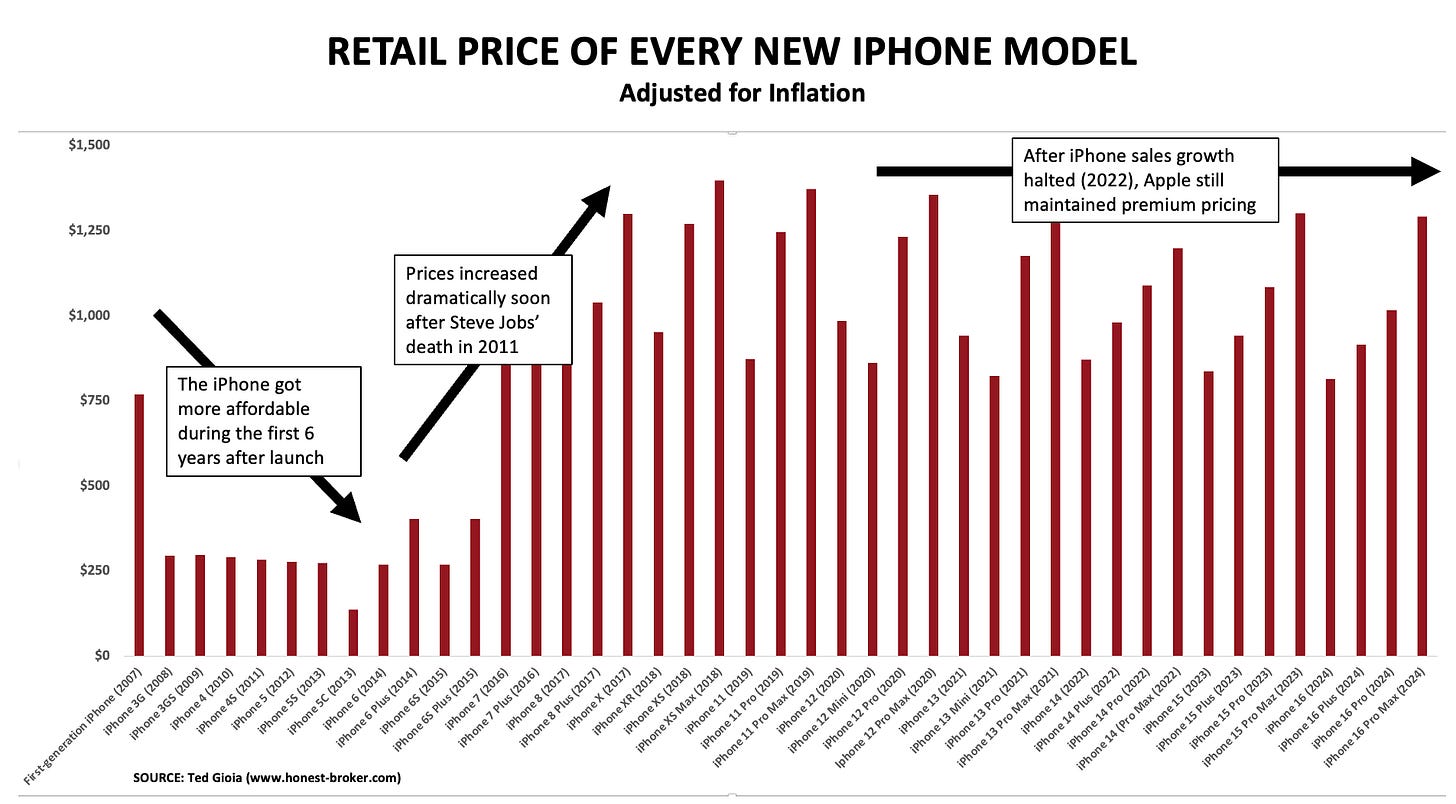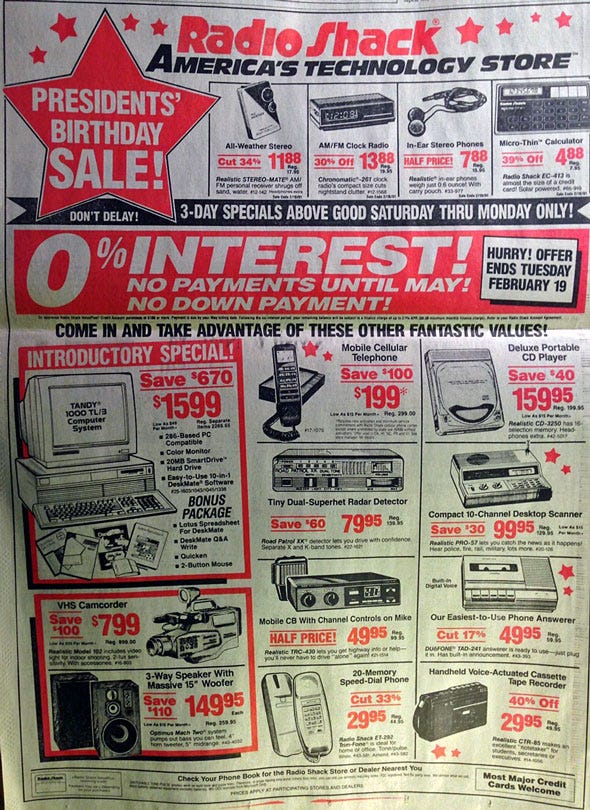Wendell Berry provided a list of nine reasonable requirements for new tech back in 1987, and they’re still appropriate today.
It wasn’t always this bad.
A few years ago, most new technology lived up to many of Berry’s requirements. But not anymore. And the pace of decline gives us a useful way of measuring how poorly we are served by the current generation of technocrats.
Let’s go back to 1987.
Wendell Berry was living on a farm in Kentucky, and did his writing with pen and paper. His wife Tanya would create typewritten drafts of his manuscripts on a Royal standard typewriter purchased in 1956—which was, he insisted, “as good now as it was then.”
But friends told him he needed a computer. It would make it easier to write, they insisted.
In response, Berry came up with his list of nine reasons to embrace new technology. Let’s revisit them, one by one.
Nine Standards for Technological Innovation
(1) The new tool should be cheaper than the one it replaces.
This is a very persuasive selling point for new technology. And for most of my life, tech companies worked hard to lower prices.
I still recall my parents scrimping and saving in order to buy a color television when I was seven years old. It cost almost $500—a huge amount in those days.
They probably should have waited. A few months later, RCA dropped prices to $399.
Prices continued to drop in later years. You can buy a high tech TV today at Best Buy for less than what my parents paid in the 1960s.
Computers also got more affordable—at least until recently.
I got my first computer (an Apple IIE) when I was in graduate school—it was an expensive gift from the Boston Consulting Group in exchange for accepting their job offer.
The list price back then was $1,400. I could never have afforded to buy it on my tight student budget.
But, over a period of many years, each subsequent computer I acquired was better and cheaper than my previous model. Alas, that happy trend has now ended.
When I buy a new computer now, I pay more. And the performance is not always better. I recently had to scrap a new desktop after only a few months, and go back to my previous model.
The new computer didn’t work as well as my five-year-old one.
When did new tech stop getting cheaper?
It happened the day Steve Jobs died. Maybe not exactly on that date—but shortly afterwards.
Look at this chart of iPhone prices, adjusted for inflation, and you can see what I mean.
(2) It should be at least as small in scale as the one it replaces.
This is another good reason to upgrade your setup. And tech did get smaller for many decades.
Guess who played a key role in that? Yes, Steve Jobs again. Because of his obsession with product design, we now carry a huge amount of advanced tech in our pocket.
Just consider this remarkable fact: Every device featured in this Radio Shack advertisement from 1991 has been replaced by your tiny phone.
Your smartphone has replaced every one of these devices.
But this, too, changed soon after Jobs died. (Are you noticing a pattern here?)
The thinnest iPhone ever was the iPhone 6 (2014)—at a slim 6.9mm. The company continued to launch ‘mini’ models for a few years, but stopped after iPhone 13.
Tech is now bulking up. It’s not just the devices—wait until you see those AI data centers. A single facility can spread over two kilometers.
(3) It should do work that is clearly and demonstrably better than the one it replaces.
This is the most obvious requirement for new tech. It needs to work better than old tech.
But Silicon Valley has totally abandoned this ideal. Every web interface I use has gotten worse over time—from search engines to social media to software to shopping apps.
Google is worse than ever. Twitter is worse than ever. Amazon is worse than ever. Facebook is worse than ever. Everything I get from Microsoft is worse than ever.
So here, too, we see that new tech previously fulfilled Berry’s requirement—but stopped doing so around the time Steve Jobs died.
But friends told him he needed a computer. It would make it easier to write, they insisted.
In response, Berry came up with his list of nine reasons to embrace new technology. Let’s revisit them, one by one.
Nine Standards for Technological Innovation
(1) The new tool should be cheaper than the one it replaces.
This is a very persuasive selling point for new technology. And for most of my life, tech companies worked hard to lower prices.
I still recall my parents scrimping and saving in order to buy a color television when I was seven years old. It cost almost $500—a huge amount in those days.
They probably should have waited. A few months later, RCA dropped prices to $399.
Prices continued to drop in later years. You can buy a high tech TV today at Best Buy for less than what my parents paid in the 1960s.
Computers also got more affordable—at least until recently.
I got my first computer (an Apple IIE) when I was in graduate school—it was an expensive gift from the Boston Consulting Group in exchange for accepting their job offer.
The list price back then was $1,400. I could never have afforded to buy it on my tight student budget.
But, over a period of many years, each subsequent computer I acquired was better and cheaper than my previous model. Alas, that happy trend has now ended.
When I buy a new computer now, I pay more. And the performance is not always better. I recently had to scrap a new desktop after only a few months, and go back to my previous model.
The new computer didn’t work as well as my five-year-old one.
When did new tech stop getting cheaper?
It happened the day Steve Jobs died. Maybe not exactly on that date—but shortly afterwards.
Look at this chart of iPhone prices, adjusted for inflation, and you can see what I mean.
(2) It should be at least as small in scale as the one it replaces.
This is another good reason to upgrade your setup. And tech did get smaller for many decades.
Guess who played a key role in that? Yes, Steve Jobs again. Because of his obsession with product design, we now carry a huge amount of advanced tech in our pocket.
Just consider this remarkable fact: Every device featured in this Radio Shack advertisement from 1991 has been replaced by your tiny phone.
But this, too, changed soon after Jobs died. (Are you noticing a pattern here?)
The thinnest iPhone ever was the iPhone 6 (2014)—at a slim 6.9mm. The company continued to launch ‘mini’ models for a few years, but stopped after iPhone 13.
Tech is now bulking up. It’s not just the devices—wait until you see those AI data centers. A single facility can spread over two kilometers.
(3) It should do work that is clearly and demonstrably better than the one it replaces.
This is the most obvious requirement for new tech. It needs to work better than old tech.
But Silicon Valley has totally abandoned this ideal. Every web interface I use has gotten worse over time—from search engines to social media to software to shopping apps.
Google is worse than ever. Twitter is worse than ever. Amazon is worse than ever. Facebook is worse than ever. Everything I get from Microsoft is worse than ever.
So here, too, we see that new tech previously fulfilled Berry’s requirement—but stopped doing so around the time Steve Jobs died.
by Ted Gioia, Honest Broker | Read more:
Images: Ted Gioia/Radio Shack/Wendell Berry, New England Review/ Breadloaf Quarterly


